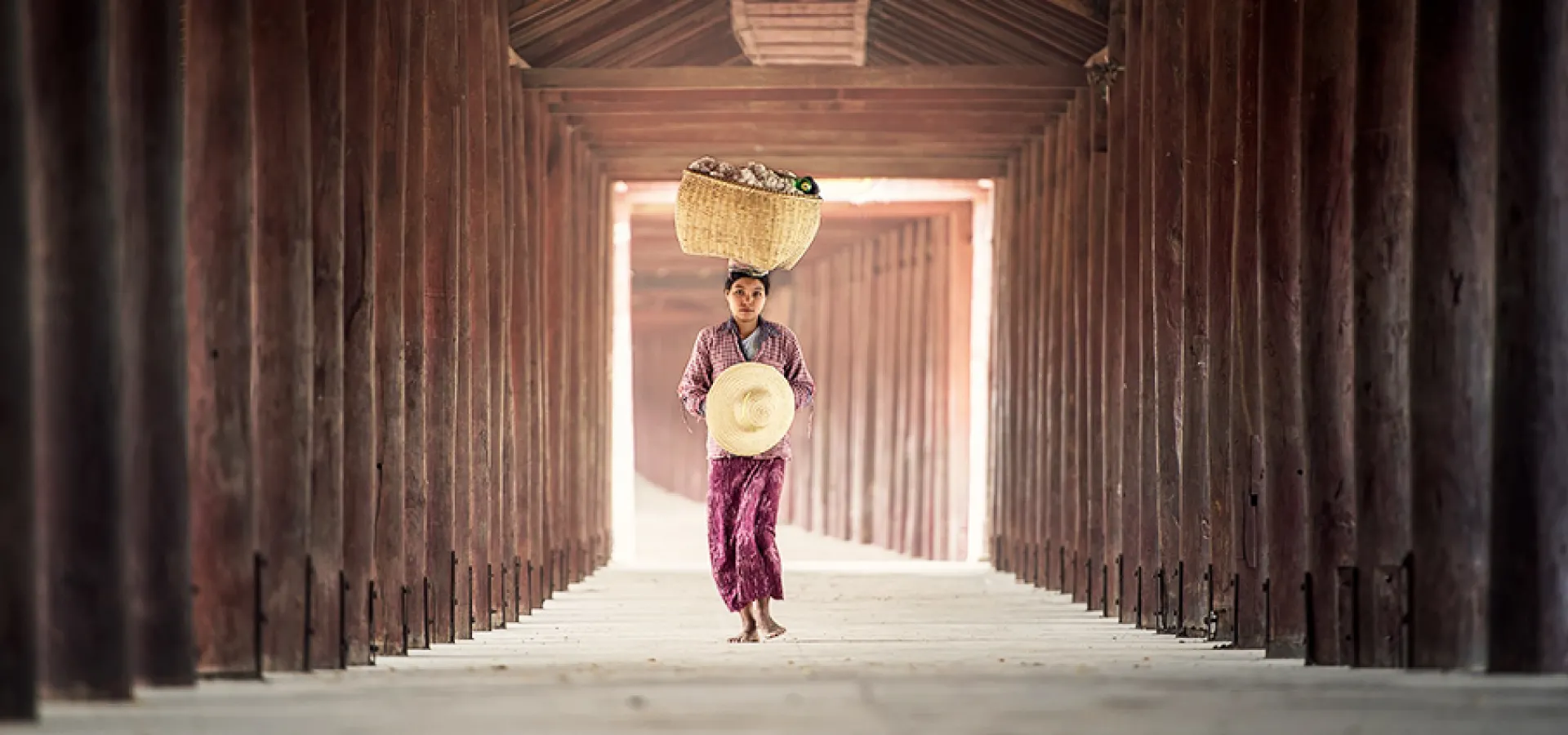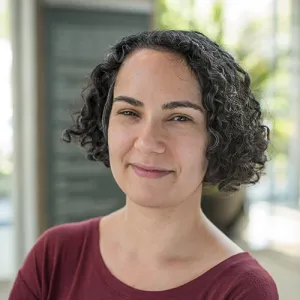
Global South Development Studies
The Global South Development Studies Program, a multidisciplinary social science program, explores the transformation of African, Asian, Latin American and Middle Eastern societies since the 16th century. The program offers students an opportunity to examine—within a comparative framework—the processes of social, economic, political and ideological change in these regions as they respond to asymmetrical contact with the wider global economy.
Requirements & Courses
Global Sount Development Studies Minor
Requirements
Six courses
- One course from history
- One course from economics
- Four courses from among the following departments: anthropology, economics, government, history and sociology. The student may petition the program through her minor adviser for one of these four courses to be from a discipline outside of the social sciences and history. Comparable courses at other colleges may be included with the approval of the minor adviser.
- Two of the courses in the minor must reflect a regional concentration on Africa, Asia, Latin America or the Middle East
- The student can include no more than two courses from any department
Courses
GSD 404 Special Studies (4 Credits)
For juniors and seniors, admission by permission of the Global South Development Studies Advisory Board. Can only be taken once to count toward the minor.
Fall, Spring
Crosslisted Courses
AFR 370 Seminar: Modern Southern Africa (4 Credits)
In 1994 South Africa underwent a peaceful revolution with the election of Nelson Mandela. This course studies the historical events that led to this dramatic development in South Africa from 1948 to 2000. {H}{S}
Fall, Spring, Variable
ANT 234 Culture, Power and Politics (4 Credits)
This course is a general introduction to anthropological analysis of politics and the political. Through a broad survey of anthropological texts and theories, we explore what an ethnographic perspective can offer to our understandings of power and government. Special emphasis is placed on the role of culture, symbols and social networks in the political life of local communities. Examples are drawn from a number of case studies in Africa, East Asia, Latin America and the United States, and range in scale from studies of local politics in small-scale societies to analyses of nationalism and political performance in modern nation-states. Enrollment limited to 30. {S}
Fall, Spring, Alternate Years
ANT 237 Monuments, Materials and Models: The Archaeology of South America (4 Credits)
This course offers an overview of the archaeology of South America, from the earliest traces of human occupation over 10,000 years ago to the material culture of the present. The course focuses on how archaeologists use data collected during settlement surveys, site excavations and artifact analysis to reconstruct households and foodways, social and political organization, and ritual and identity over the millennia. Discussions also include the relevance of the past in contemporary indigenous rights movements, heritage management strategies and nationalist projects. {N}{S}
Fall, Spring, Alternate Years
ECO 211 Economic Development (4 Credits)
An overview of economic development theory and practice since the 1950s. Why have global economic inequalities widened? What economic policies have been implemented in the developing countries of Asia, Latin America, Africa and the Middle East in search of economic development, what theories underlie these policies, and what have been the consequences for economic welfare in these regions? Topics include trade policy (protectionism versus free trade), financial policy, industrial development strategies, formal and informal sector employment, women in development, international financial issues (lending, balance of payments deficits, the debt and financial crises), structural adjustment policies and the increasing globalization of production and finance. Prerequisites: ECO 150 and ECO 153. {S}
Fall, Spring, Annually
ECO 295 International Trade and Commercial Policy (4 Credits)
An examination of the trading relationships among countries and of the flows of factors of production throughout the world economy. Beginning with the theories of international trade, this course moves on to examine various policy issues in the international economy, including commercial policy, protectionism and the distribution of the gains from trade, multilateral trade negotiations, preferential trade agreements, the impact of transnational firms and globalization, immigration, and trade and economic development. Prerequisite: ECO 250. {S}
Fall, Spring, Annually
GOV 220 Introduction to Comparative Politics (4 Credits)
This course introduces students to comparative political analysis and provides a foundation to better understand major political, economic and social forces in a diverse set of countries. The course first focuses on key methods and concepts such as state and nation, asking where states come from and how are nations built. Students then address questions including: Why are some countries democratic and others authoritarian? How do states promote or stymie economic development? What role do civil society and social groups play in political and economic transition? The course combines theoretical and conceptual analysis with cases drawn from around the world. Designation: Comparative. {S}
Fall, Spring
GOV 224 Colloquium: Globalization From an Islamic Perspective (4 Credits)
This course explores the complex challenges facing Muslim-majority states when it comes to their political, economic, and social development in the 21st century. In particular, we will be exploring the various Islamically-inspired ideas ("isms") that have emerged with the onset of globalization; from Islanic feminism and Islamic environmentalism to political Islam and Islamic banking. Designation: Comparative. Enrollment limited to 20. {S}
Fall, Spring, Alternate Years
GOV 230 Chinese Politics (4 Credits)
The People’s Republic of China represents approximately one quarter of the world’s population, sustains the largest bureaucracy in the history of the world, and currently possesses of a system of political economy that combines elements of both communism and capitalism. This course introduces students to the basic concepts of political processes, political institutions, and political events in China, primarily focusing on the reform era (1978-present). Specifically, we examine China’s political institutions, political economy, state-society relations, and the politics of Hong Kong and Taiwan. Designation: Comparative. {S}
Fall, Spring, Variable
GOV 237 Colloquium: Politics of the U.S./Mexico Border (4 Credits)
This course examines the most important issues facing the U.S./Mexico border: NAFTA, industrialization and the emergence of the maquiladoras (twin plants); labor migration and immigration; the environment; drug trafficking; the militarization of the border; and border culture and identity. The course begins with a comparison of contending perspectives on globalization before proceeding to a short overview of the historical literature on the creation of the U.S./Mexico border. Though at the present time the border has become increasingly militarized, the boundary dividing the United States and Mexico has traditionally been relatively porous, allowing people, capital, goods and ideas to flow back and forth. The course focuses on the border as a region historically marked both by conflict and interdependence. Designation: Comparative. Preference to majors in government and/or Latin American studies. Enrollment limited to 20. {S}
Spring
GOV 241 International Politics (4 Credits)
An introduction to the theoretical and empirical analysis of the interactions of states in the international system. Emphasis is given to the historical evolution of the international system, security politics, the role of international norms in shaping behavior and the influence of the world economy on international relations. Not a course in current events. Designation: International Relations. Enrollment limited to 50. {S}
Fall, Spring
GOV 242 International Political Economy (4 Credits)
This course begins with an examination of the broad theoretical paradigms in international political economy (IPE), including the liberal, economic nationalist, structuralist and Marxist perspectives. The course analyzes critical debates in the post-World War II period, including the role of the Bretton Woods institutions (World Bank group and IMF), international trade and development, the debt question, poverty and global inequality, and the broad question of "globalization." Designation: International Relations. Prerequisite: GOV 241 or equivalent. First-year students may enroll only if they have completed GOV 241. Enrollment limited to 40. {S}
Fall, Spring, Annually
GOV 252 International Organizations (4 Credits)
What role do international organizations play in world politics, and what role should they play? Do international organizations represent humanity’s higher aspirations or are they simply tools of the wealthy and powerful? This course explores the problems and processes of international organizations by drawing on theoretical, historical and contemporary sources and perspectives. The course focuses on three contemporary organizations: the United Nations, the World Trade Organization and the European Union. Designation: International Relations. Prerequisite: GOV 241 or equivalent. Enrollment limited to 50. {S}
Fall, Spring, Annually
GOV 257 Colloquium: Refugee Politics (4 Credits)
This course examines refugees--i.e., people displaced within their country, to another country or, perhaps, somewhere "in between." Refugee politics prompt a consideration of the cause of refugee movements; persecution, flight, asylum and resettlement dynamics; the international response to humanitarian crises; and the "position" of refugees in the international system. In addition to international relations theory, the seminar focuses on historical studies, international law, comparative politics, refugee policy studies and anthropological approaches to displacement and "foreignness." Although special attention is devoted to the Middle East, other cases of refugee politics are examined. Designation: International Relations. Open to majors in government; others by permission of the instructor. Enrollment limited to 20. {S}
Fall, Spring, Alternate Years
HST 200 Modern East Asia (4 Credits)
This introductory course looks comparatively at the histories of China, Japan and Korea from the late 18th century to the present. It examines the struggles of these countries to preserve or regain their independence and establish national identities in a rapidly emerging and often violent modern world order. Although each of these countries has its own distinctive identity, their overlapping histories (and dilemmas) give the region a coherent identity. We also look at how individuals respond to and are shaped by larger historical movements. {H}
Fall
HST 258 Modern Africa (4 Credits)
This course provides an introductory survey of African history under colonial rule and beyond. In doing so, the course offers students a framework for understanding the political, social and economic history of modern Africa by foregrounding the strategies African peoples employed as they made sense of and confronted their changing historical landscapes. Key subjects include the construction of the colonial state, African experiences with colonial rule, the dilemmas of decolonization and life in an independent Africa. {H}{S}
Fall, Spring, Alternate Years
HST 259dd Colloquium: Topics in African History-Discourses of Development (4 Credits)
This course interrogates and historicizes the problem of “development” in 20th-century Africa. In doing so, we query the assumptions made by colonial officials, postcolonial leaders, social scientific experts and local communities as they sought to understand and articulate African pathways into a largely ill-defined social and economic modernity. Key subjects of enquiry include an analysis of the relationship between western and non-western “modernities,” and explorations into the link between knowledge and power in our own interpretations of the past and of the so-called “underdeveloped world.” Enrollment limited to 18. {H}
Fall, Spring, Variable
HST 259fm Colloquium: Topics in African History-Femininities, Masculinities and Sexualities in Africa (4 Credits)
This course examines the political, social and economic role of women, gender, and sexuality in African history, while paying particular attention to the ways in which a wide variety of Africans engaged, understood, and negotiated the multiple meanings of femininity, masculinity, and sexuality in the changing political and social landscapes associated with life in Africa. Key issues addressed in the course include marriage and respectability, colonial domesticity regimes, sex, and religion. Additionally, students interrogate the diversity of methodological techniques scholars have employed in their attempts to write African gender history. Enrollment limited to 18. {H}
Fall, Spring, Variable
SOC 232 World Population (4 Credits)
This course introduces students to environmental, economic, feminist and nationalist perspectives on population growth and decline. The course examines current population trends and processes (fertility, mortality and migration) and considers the social, political, economic and environmental implications of those trends. The course also provides an overview of various sources of demographic data as well as basic demographic methods. Prerequisite: SOC 101. Enrollment limited to 35. {S}
Fall, Spring, Alternate Years
SOC 237 Gender and Globalization (4 Credits)
This course engages with the various dimensions of globalization through the lens of gender, race and class relations. We study how gender and race intersect in global manufacturing and supply chains as well as in the transnational politics of representation and access in global media, culture, consumption, fashion, food, water, war and dissenting voices. Prerequisite: SOC 101. Enrollment limited to 25. {S}
Fall, Spring, Annually
SOC 327 Seminar: Global Migration in the 21st Century (4 Credits)
This course provides an in-depth engagement with global migration. It covers such areas as theories of migration, the significance of global political economy and state policies across the world in shaping migration patterns and immigrant identities. Questions about imperialism, post-colonial conditions, nation-building/national borders, citizenship and the gendered racialization of immigration intersect as critical contexts for our discussions. Prerequisite: SOC 101. Enrollment limited to 12. Juniors and seniors only. Instructor permission required. {S}
Fall, Spring, Alternate Years
Faculty
Contact Global South Development Studies
Wright Hall
Smith College
Northampton, MA 01063
Phone: 413-585-3572
Administrative Assistant: David Osepowicz
Prospective students who wish to learn more about the Global South Development Studies Program may contact Greg White, director of the program.




